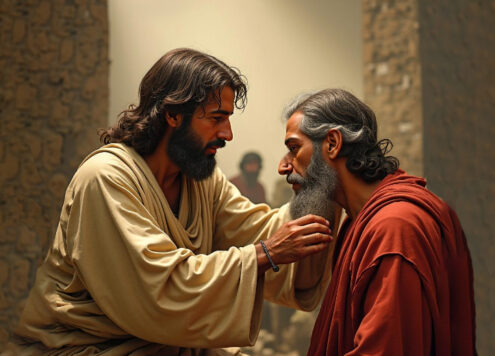The Passion of Christ is celebrated every Palm Sunday, and has all the elements of a Greek tragedy, except that it has more.
It begins with Jesus’ joyful entry into Jerusalem as the long awaited Messiah with an enthusiastic crowd throwing palms along His route. Then it switches to tragedy but does not end in tragedy like a Greek drama. It ends in victory. It is recorded in all the gospels and is more than a record of one individual’s suffering. It is a process through which all who call themselves Christians must go through. That is why there is so much we can identify with in this Palm Sunday and Passion account of the life of Christ.
Generally, we tend to see ourselves in this story only as sympathetic bystanders. But we are more than that. We are the judges, the betrayers, the cowardly disciples and the executioners. How often do we rush to judgment by condemning others or betraying their trust? How quickly are we ready to unleash a bitter tongue, a piercing remark, a snap judgment? How mercilessly do we find ourselves following the crowd, taking the easy way out and shirking our responsibility to follow Christ? We may not like thinking about such things, but we must if we are to enter into the passion of Christ and cast off the old person and rise again to new life.
The sins of the judges, disciples and executioners, for whom Christ died, were not just the past-sins of those who condemned Him over two thousand years ago. They are present-day sins which people commit daily. They are the sins of omission of those in authority who turn a blind eye to evils in our midst or fail to act in a timely manner to avoid dire disasters for people in their charge. The list is long. Think of today’s Coronavirus crisis, for example. Think of the useless wars that have ravaged cultures, uprooted innocent people and laid waste to the infrastructures of entire countries! These are also the sins of disinterested people who daily turn on each other, unleash a bitter tongue and refuse to forgive and see Christ in their neighbor.
We are invited in the passion story to identify with Christ on the cross. But doing so is not easy, for it means saying “yes” to demanding questions. Are we willing to be vulnerable, to forgive those who hate us? Can we choose to love rather than seek revenge? Can we strive for unity among Christians rather than division? Can we choose life over death?
To identify with Christ on the cross is to follow him to the cross. It means to say “yes” to all these cross-bearing questions, to renounce the seductions and attachments to sin in our world.
Every year, as we celebrate Palm Sunday and the Passion of Christ we become part of a great drama. We recall how a master became a servant, how he humbled himself and yet was exalted above every other creature, how death was swallowed up in life, how he gave us his word, his example, and the new Passover of the mass at the last supper.
This story, re-told in all four synoptic gospels, is the story of Christ’s love for us. This love is so great He sacrificed His life on the cross that we might do the same. “Greater love,” He said, “no man has than to lay down his life for his friends” (John 15:13).
Many Doctors and Nurses and Care-Givers are doing God’s work by sacrificing their lives to heal the lives of others during this Coronavirus pandemic. Let’s keep them in our prayers and commend them to the loving care of our Heavenly Father.
Sacrifice and Love, all wrapped up in one, is Christ’s lasting gift of Palm Sunday.
—Fr. Hugh Duffy











4 Comments
Michael
Awesome and well said gives one something to think about
John Coppinger
Fr Duffy it has been quite a while. I have never forgot your kindness that you rendered me in my low part of my life. Traveled to Melrose,MA and.asked.for your assistance. You responded right away no questions.If you could respond with an e-mail with your address I would like to return the kindness to you or a charity you pick out.God bless you and yours.
Hugh Duffy
John: It was my pleasure to help you in your time of need. You don’t owe me anything.
I hope you and the family are doing well and taking good care of yourselves during this crisis.
Rachel & Robert
Thank you so much for this nice reflection.
Today, April 6 is your birthday Father Duffy. HAPPY BIRTHDAY!
Let me sing to you:
‘Happy to you, may the Good Lord bless you.
May He fills you with His Love. Now and forever more.’
Together in Christ and with Mary, our Mother.
Rachel & Robert – Snowbirds in Okeechobee FL